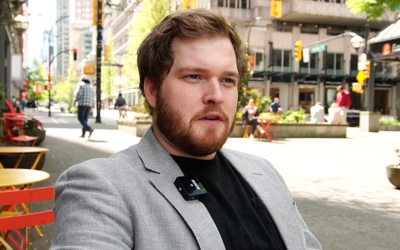Ask the Experts: Privacy, Security, and Trust. Breaking Down San José’s AI Approach with Albert Gehami
In the latest edition of UrbanLogiq’s “Ask the Experts” series, we delve into the intricacies of deploying artificial intelligence within government sectors. Our discussion dives into valuable lessons learned, best practices for success, and the critical role of data governance in ensuring the effective integration of AI with the City of San José’s Privacy Officer, Albert Gehami.
 Meet the Expert: Albert Gehami, is the Privacy Officer for the City of San José and a recognized leader in AI governance, data privacy, and cybersecurity. He played a key role in launching and continues to advance the Gov AI Coalition, a network of over 600 agencies shaping AI governance across the United States. With a background in both data science and policy, Gehami ensures that San José adopts AI responsibly, with a strong focus on transparency, security, and public trust.
Meet the Expert: Albert Gehami, is the Privacy Officer for the City of San José and a recognized leader in AI governance, data privacy, and cybersecurity. He played a key role in launching and continues to advance the Gov AI Coalition, a network of over 600 agencies shaping AI governance across the United States. With a background in both data science and policy, Gehami ensures that San José adopts AI responsibly, with a strong focus on transparency, security, and public trust.
As artificial intelligence (AI) becomes increasingly integrated into public sector projects, ensuring strong privacy and security measures has never been more critical. Cities face a delicate balancing act: leveraging AI to improve efficiency and services while maintaining public trust and safeguarding citizen data. Albert Gehami, the City Privacy Officer for San José, has been at the forefront of this effort, working to ensure AI is used responsibly and ethically and with resident buy-in at the city.
The Role of Privacy in AI Adoption
For San José, privacy and AI are inextricably linked. “My role as the Privacy Officer is about making sure that the data we collect on our residents is used to support and benefit our community,” says Gehami. “That extends to AI because I can process and collect the data how I want, but it all falls apart if the data is then used for a bad AI or something that’s inaccurate or ineffective.”
This emphasis on the ethical use of data means AI initiatives in San José must be transparent, accountable, and aligned with the needs of the community. Gehami highlights that trust is at the core of this approach. “It’s about building trust in how you are using technology and bringing your residents along for innovation. Today that innovation is AI. Tomorrow it might be something different. But the point is that we are bringing our community along for that journey.”
Lessons from Real-World AI Implementations
The City of San José has learned firsthand how privacy concerns can shape public perception of AI or any new initiatives. Gehami recalls an instance when the city planned to install automated license plate readers. “When we first decided to just put out the cameras, folks were asking questions like, “why are you doing this? Is this Big Brother?” Gehami explains. “So we took a step back and decided to engage our residents before rolling out any more cameras. Once we had those conversations, residents moved from asking why are you doing this? to here’s where I want you to put the cameras.”
This shift in dialogue demonstrated that privacy isn’t just about compliance—it’s about engagement. Gehami says when residents understand how technology benefits them and are included in the decision-making process, they become active participants rather than skeptical bystanders.
“It was that shift in collaboration that really clicked for us. It’s when we realized, oh, this is something that our residents not only care about, but we can gain valuable information on how to serve them better by engaging them on these topics,” said Gehami.
Data Ownership: A Key Consideration
According to Gehami, one of the biggest privacy concerns cities face when adopting AI is data ownership. “How do we make sure that when we’re partnering with external entities—whether it be a vendor or a university—the city has ownership over the data?” Gehami asks. “Too often, we see situations where a city gives their data to a company and then they can’t get it back, or it’s in a weird format that doesn’t let you download it or use it again.”
To mitigate this, Gehami worked with the Gov AI Coalition to develop contracting language that ensures cities retain control over their data. “It’s about making sure that you have that control because it’s through that control that you can put the protections that you and your residents expect on it.”
Ensuring AI Security and Compliance
Privacy and security are foundational to AI projects, but Gehami warns against treating AI as a separate category that requires completely new privacy protocols. “One of the pitfalls we’ve seen in cities is thinking that because AI is involved, different rules suddenly apply,” he says. “At the end of the day, I’m still a steward of our residents’ data, and I need to make sure that data is securely managed—whether it’s being accessed through a chatbot, a database, or an AI model.”
San José has taken proactive steps to educate city staff on responsible AI use. “We put out generative AI guidelines in 2023 that showed staff how to use these tools effectively and responsibly. It boils down to understanding that it’s not the AI’s responsibility to be right and serve residents. It is our responsibility to be right and serve our residents,” said Gehami.
As organizations explore AI, Gehami says it’s crucial to ensure staff understand this mindset from the start while encouraging a culture of experimentation in a safe environment.
“You take that approach of experimentation, of learning in a safe environment where even if you do make a mistake, it’s not the end of the world,” said Gehami “that’s really where you want to be.”
Fostering growth and responsible adoption starts with the point of view that mistakes are learning opportunities rather than failures.
AI is Only a Small Piece of the Puzzle
AI might be a buzzword surrounded by hype, but Gehami says it’s only a small piece of the puzzle. Reflecting on his experience as a data scientist for the City of San José, he emphasizes that most of the work wasn’t about running AI models—it was about cleaning and structuring data. “The hard part is actually just making sure that the data is right, the data is accurate, the data is useful,” he recalls. “I spent about 80 to 90% of my time just cleaning data, making sure that it’s spelled correctly, it’s formatted correctly, that we can actually trust it.”
Garbage in, garbage out. “If you’re putting unreliable or inaccurate data into a system, it’s going to give you inaccurate outputs,” Gehami explains. Especially for AI-driven predictive analytics, data quality is key. “Once you have that, the AI part is pretty straightforward.”
That’s why Gehami says organizations should prioritize data accuracy, formatting, and regular updates. Gehami sees AI’s hype as a way to push long-overdue data governance improvements. “We’ve been talking about data governance for decades,” he says. “If I can use the shiny toy of AI as a way to get people to actually do the fundamentals, all of a sudden we’re going to be in a much better place than we are today.”
Cross-Government Collaboration
“Collaborating across governments is our secret weapon,” said Gehami.
For San José, collaboration has been key to navigating AI governance and security challenges. The city has drawn inspiration from best practices in other jurisdictions. “Our privacy framework was pulled from the National Institute of Standards and Technology (NIST),” says Gehami. “When we started diving into AI, we based a lot of our work on what we found in Amsterdam and their algorithmic inventory.”
This willingness to learn from others extends beyond individual cities. The Gov AI Coalition, a network of hundreds of agencies across the United States founded by the City of San José continues to play a critical role in sharing AI governance strategies. “If someone learns something in North Dakota, we can take that information and grow from it in San José. And if something works for us, we can share it with others. That kind of collaboration has allowed us to push the frontier faster and better than we ever could alone.”
Gehami’s biggest piece of advice for cities looking to implement AI responsibly? “Go check out the Gov AI Coalition. All this work is already being done by hundreds of cities, counties, and agencies. You don’t have to reinvent the wheel—just learn from others. The coalition has helped cities get 80% of the way there, and we can navigate the last 20% together.”
The Power of a “One City” Approach
Residents don’t experience a city as separate departments—they see it as one entity. “No resident comes to city hall and says, I need help from specifically the Department of Transportation at the City of San Jose,” says Gehami. “They are coming to the city and saying, I need help from the city.” That’s why San Jose has embraced a “One City” approach, ensuring services work seamlessly across departments.
Collaboration is key for complex challenges like housing, homelessness, or waste management. “All the problems that we are facing today… it’s incredible how it intersects so many different departments,” Gehami explains. “There is no way to solve these problems in our silos.” Data helps break down these silos, enabling coordination.
Take a 311 call about trash in a river. “That 311 call goes to information technology, then I need to route that to our environmental services. Maybe some of that material needs to be routed to a contractor, maybe some of that needs to be routed to our water,” Gehami describes. “And all of a sudden, you have this requirement where the solution itself requires all those different departments.”
While data sharing fuels collaboration, it also raises privacy concerns. “Anyone who’s in government has probably experienced the setting of, Oh, if only I had this data that this other department has, I could do something incredible. And then you go to the other department and they’re scared,” Gehami notes.
To overcome this, San José’s privacy team provides guidance. “What’s actually enabled us to do that is by having a privacy team, we can walk them through how to safely and securely share their data across departments and work as one team.”
Balancing Innovation with Ethical Responsibility
Innovation in government AI is only effective when it aligns with community needs. Gehami emphasizes that cities must proactively engage their residents in determining ethical boundaries. “There’s always a red line for AI. But here’s the thing—before we even get close to those controversial areas, there are so many ways AI can improve government efficiency that no one would complain about,” he says. “No one is going to argue against AI making it faster to process permits or figure out where to place speed bumps.”
“I could try and define for you a red line. And that red line is going to be different for every community, for every city,” said Gehami. “But let’s focus on a lot of the quick wins that we have today that can save literally thousands of hours of staff time and make our services faster and better for our residents.”
Gehami says transperancy is a key pillar and the City of San José sticks to that —even when projects don’t succeed.
“Sometimes the pilot is just a waste of time. And we had one of those very recently. But what we did is we told our community, hey, we tested this out, it didn’t work so well. And we were the ones to tell that story, building that trust that our residents understand that if something goes wrong, the first people to let them know are us is the city. That’s huge,” said Gehami.
Key Considerations When Working with Vendors
Gehami stresses the importance of data security and trust as top priorities when partnering with vendors. “I have to ask, how are they handling the data and does it match the security practices that we’re doing in the city?” says Gehami. Ensuring vendors follow recognized security standards is paramount, especially for sensitive data. “Making sure that the vendor has the same expectations that I do, that I can trust that they act as a steward of the data in our city, is essential.”
At the same time, cities should embrace open data where possible. “Not all city data carries privacy concerns,” Gehami notes. “Traffic flow, water management—these are areas where we can openly share data. By doing so, we encourage innovation.” Open data allows universities, researchers and others to develop projects that benefit the community.
By balancing privacy with data sharing, cities can foster collaboration Gehami says. “When you do it right, you’re building a collaborative environment that actually allows your community to serve and help your community alongside the actual city government.”
San José’s AI governance model—rooted in transparency, community engagement, and privacy-first principles—offers a blueprint for cities worldwide. As AI adoption grows, these values will be key to ensuring technology serves the public good while maintaining trust and security.
How UrbanLogiq helps
UrbanLogiq’s data analytics platform helps governments make the most out of their existing data by breaking down data silos and integrating diverse data sets, to inform better decision making. Our end to end data platform sets the standard around robust data management while addressing concerns around the responsible use of AI, security, compliance and integrity of data. This approach enhances operational efficiency and transparency to ensure safe and equitable communities.
Our story: https://youtu.be/hmp-eRd8OUg
About Ask the Experts
Urbanlogiq’s ‘Ask the Experts’ series launched in the summer of 2022. It taps into the knowledge of industry experts to explore a variety of subjects. These include artificial intelligence, data science, public safety, transportation planning, and more, offering insights on a variety of timely topics. ‘Ask the Experts’ sets out to provide valuable information and resources through in-person or virtual interviews and blogs.
If you would like to be a guest on the series, contact UrbanLogiq’s Head of Corporate Affairs, Luisa Alvarez.


